Blog
Youth Mentoring Program Launching in January
January is National Mentoring Month and we are excited to launch our new Youth Mentoring Program in partnership with the Memphis Grizzlies! Learn how you can join us a youth mentor – check out this video and read more here.
Shawnee McDonnell has always had a heart for vulnerable populations, especially refugees. After graduating last May from Missouri State University with a Global Studies major and minors in Latin American Studies and Spanish, she was thrilled to join us as an AmeriCorps Vista member. Her time at World Relief has already given her an important first-hand glimpse into refugee issues in the United States and the challenges of adjusting to a new and very different culture. She has drawn on her experience studying abroad in Costa Rica to help her understand, in some small way, what it is like to be in a new place and have to get around without really knowing the language. Combined with domestic volunteer experience in poverty relief, her background informs her work here at World Relief. During her term here, she is building a refugee youth mentoring program in the Memphis area from the ground up as part of a state-wide initiative.
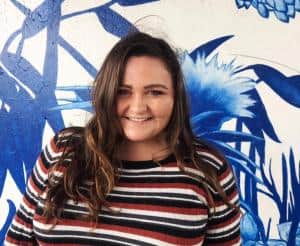
Our program will be one of several across Tennessee intended to provide additional support to refugees ages 15-24, who are navigating their own coming of age alongside the difficult transition into the United States. To prepare for the launch of the World Relief Memphis program in January, Shawnee has been researching similar programs across the country and best practices for youth mentoring. Through this, she has come to understand the importance of supporting refugee youth in their personal, career, and educational goals by giving them space to dream with a dedicated mentors and mentees. These mentors will be members of the welcoming Memphis community, including well-established immigrant communities. The program is voluntary, but we anticipate sustained interest among many of our eligible clients, as this fills an important role in creating opportunities for integration within our community.
For the first three months of the program, the mentees and mentors will meet in a small (virtual) group with the program coordinator as they get to know each other and build rapport. For the rest of their year commitment, they will continue to meet as a small group without the program coordinator as they set goals and learn new skills. They will also benefit from trainings and events held by the Memphis Grizzlies Foundation “Mentor Memphis Grizzlies.”
These relationships will contribute to the success and integration of these youth as they begin to establish their adult lives in the United States. We are excited to see how creating space to dream empowers these young people to pursue their passions. These achievements will contribute to the richness of our community and state, and even can contribute to breaking cycles of generational poverty.
Shawnee has seen first-hand how trust placed in someone can create a sense of pride and self confidence through her own work here and hopes to create a similar experience in this program. She has seen how the investment of a little bit of time and direction goes a long way in establishing a support network for those who are trying to figure out their next step in life. Therefore the confidence and knowledge she is gaining undoubtedly will serve her well in whatever she chooses to pursue once her time with us is completed, as she gains experience about the realm of non-profit service.
Does the challenge that refugee youth face resonate with you? Would you like to make a difference? Get started HERE.

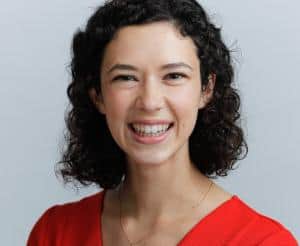
Sarah Barnett is the Mobilization Intern for World Relief Memphis and a senior at Furman University in South Carolina. She majors in Political Science and Spanish, and is passionate about influencing where people and policies collide.
Small Business Saturday & 2020 Gift Guide
At World Relief, we believe that every single one of us is made for change — both in our own lives and in communities across the globe. Throughout this holiday season, we’ve created a list of companies and products that embody our commitment to change in our Made for Change Gift Guide.
Each of these companies is committed to serving those in vulnerable situations by partnering with World Relief. When you purchase a gift from this gift guide, you’ll not only support the work of World Relief, but you’ll be investing in small businesses across the U.S as well.
So what are you waiting for? Shop the gift guide, and create the change you know you were made for.
17Berkshire – Memphis
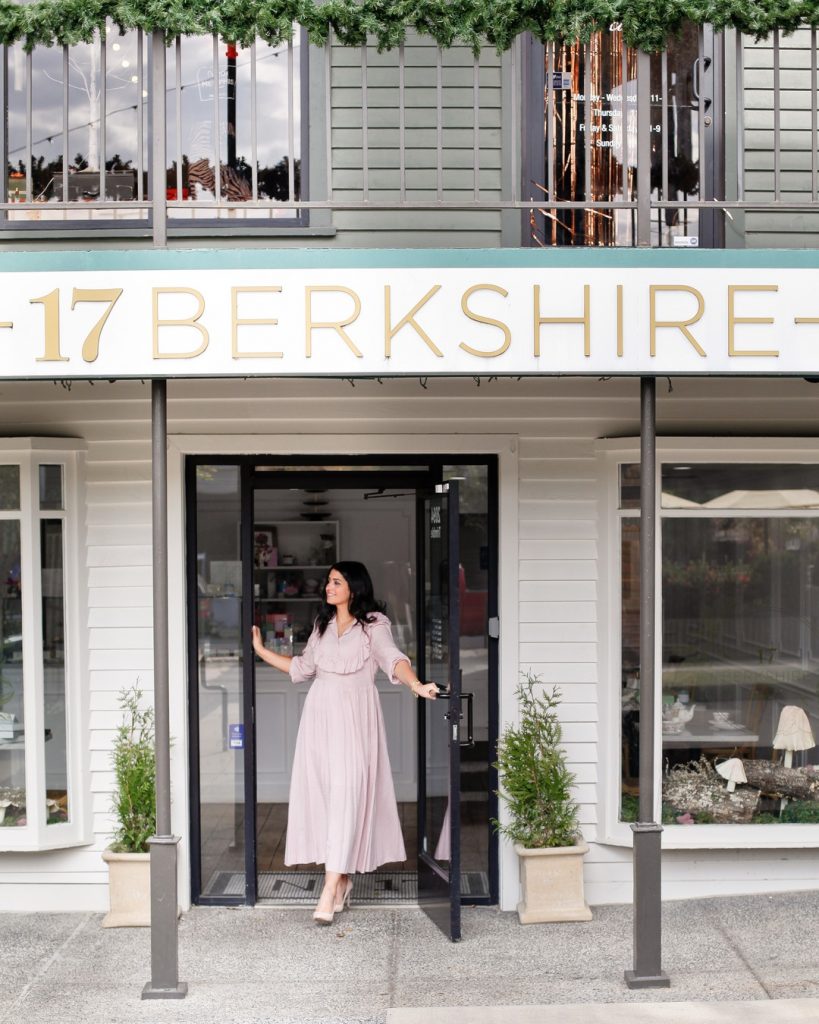
17Berkshire is a Memphis-made Patisserie on Overton Square offering European desserts with flavors nodding to both the deep South and Middle East. Treat the sweet people in your life with macarons, afternoon tea, specialty coffees, gift items in the shop, or gift card for future use.
prettyinside.

For the woman (or man!) in your life that wants their outside to shine as brightly as their inside, pick up a few face masks from Musee Bath’s newest line, prettyinside.
Prettyinside is built on the belief that all women are beautiful, that they are created in the image of God and that beauty is more than skin deep. Empower the women in your life to take a look in the mirror and channel their inner strength, courage and beauty. All prettyinside products are sourced with the best plant-based ingredients for your skin. The packaging is 100% recyclable, and a portion of all sales go to support refugee women through the work of World Relief. “World Relief is one of the foremost organizations addressing the needs [of refugees], and because this is a beauty brand and it’s targeted to women, I wanted to work with somebody that worked a lot with women and children. We are incredibly excited to be partnering with World Relief are so thankful for the work they do that makes a difference in the lives of so many women around the world.” – Leisha Pickering, founder
Pen + Pillar
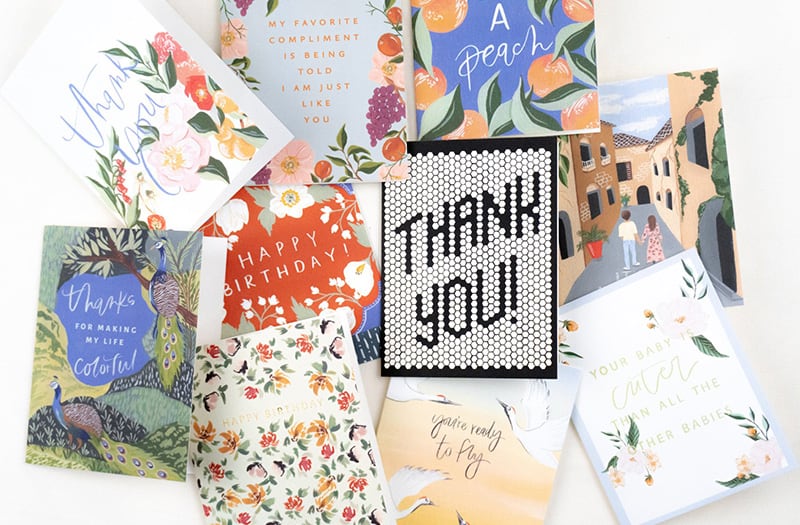
For the writer and kind-hearted giver in your life, shop owners Taylor and Justin have created a series of notebooks, greeting cards and art prints that your loved one is sure to enjoy. Each gift is inspired by Taylor and Justin’s love of nature, travel, community and warmth. A portion of each purchase goes to support World Relief!
InSenseUSA
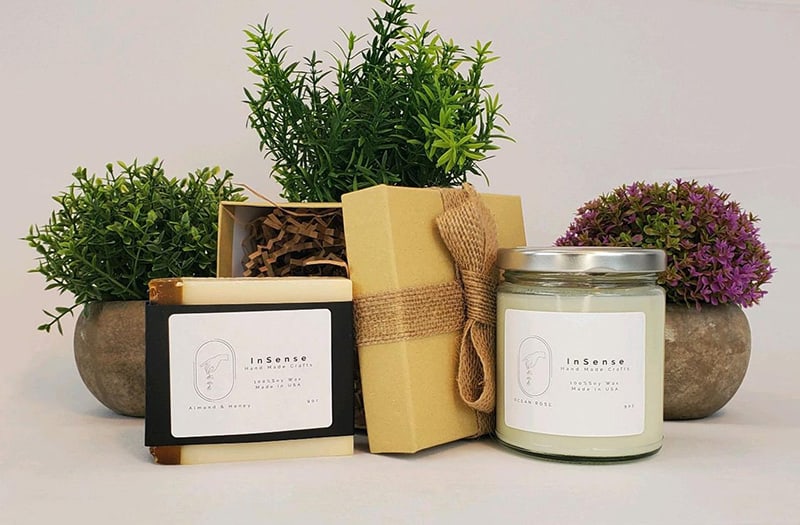
For the people in your life who need to indulge in a little self-care, InSenseUSA is your go-to shop. This collection of candles, soaps and bath bombs are all handcrafted with love in Wheaton, Illinois.
Shopowner Al Alsaadi and his parents fled their home in Iraq several years ago and were eventually resettled in the U.S. They got connected with World Relief, and with hard work and a resilient spirit, they rebuilt their live in the Chicago suburbs. Al is now a design engineer, part-time college professor and small business owner. He’s excited to give back to World Relief because of how much he feels World Relief has given to him.
“I am excited to give to World Relief simply because I wouldn’t be here, and I would not succeed in my life without World Relief. From the first day I came to the States up until to this moment — of having my own small business — Word Relief is on my side helping me. We are in this life to change someone’s life. We might be planning on doing it or not, but if we stop for a minute and think through it, we might have changed someone’s life just by smiling and saying good morning.” -Al Alsaadi
When You Can’t Go Home
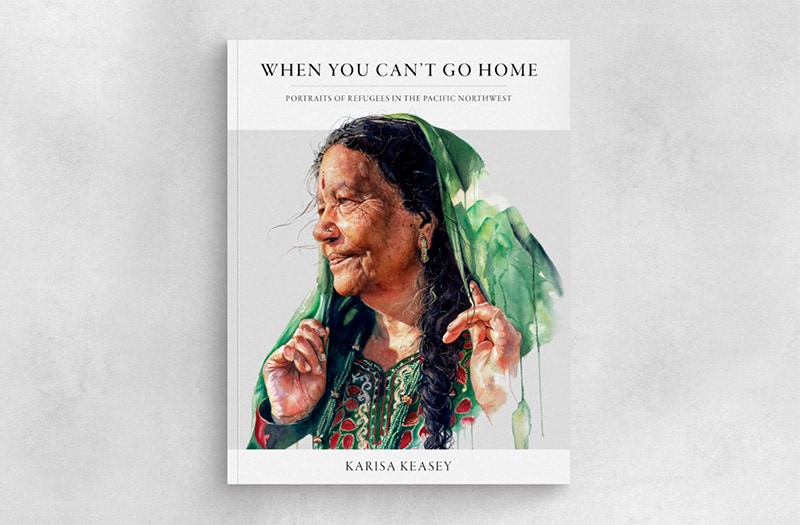
This beautiful book is perfect for the avid reader and art lover in your life. Seattle-based artist Karisa Keasey spent two years interviewing refugees and painting portraits to accompany their stories. She combined the artwork and stories in this stunning book you can purchase on her website. 50% of the profits will be donated to World Relief.
“These are tough times right now and we are all in need of healing. Healing happens in community, and community happens by pouring into others. World Relief embodies this community and knows what it is like to walk alongside some of the most vulnerable.” – Karisa Keasey
Refugee Bath Co.

Love. Energy. Nourish. Soothe. These are just a few of the words used to describe the bath bombs from Refugee Bath Co. whose mission is to provide opportunities for refugees in Washington to thrive.
Give the gift of fun and indulgence to a special friend or family member in your life, and why not throw an extra bath bomb set in the cart for yourself? When you enjoy these products, you make a difference in the lives of refugee women and men in the United States, as a portion of their profits are donated to refugee support services.
Amazon Smile
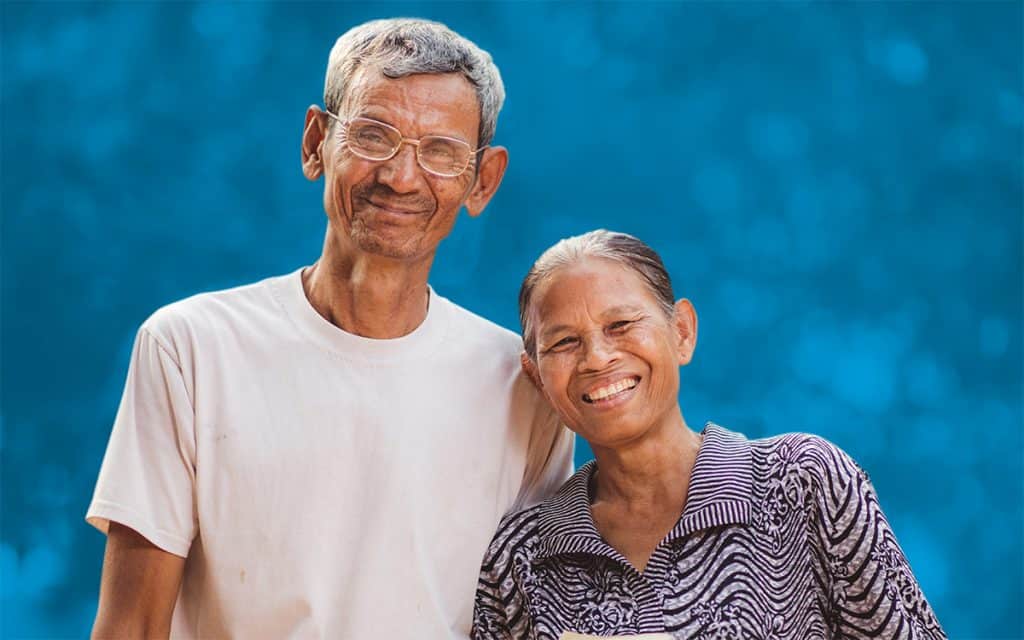
Did you know your Amazon purchases can support World Relief? They can through Amazon Smile! Every time an Amazon Smile customer makes a purchase, 0.5% of the price of eligible purchases will be donated to a charity of your choice.
If you can’t find what you’re looking for from one of the amazing businesses in this gift guide, or if you’re already shopping on Amazon, then follow the steps below to shop on Amazon Smile and Amazon will donate to World Relief on your behalf:
Visit smile.amazon.com and sign in to/register for your account
Type World Relief Corp. of National Association of Evangelicals as your selected charity
As you shop, be sure you’re using smile.amazon.com to make purchases (the same products are available on smile.amazon.com as on amazon.com or the mobile app).

Rachel Clair serves as a Content Writer at World Relief. With a background in creative writing and children’s ministry, she is passionate about helping people of all ages think creatively and love God with their hearts, souls and minds
Spokane man crafts 300 cutting boards for refugee families
Ron Johnson delivered a new batch of his custom-made maple & walnut cutting boards in July. Each of his one-of-a-kind boards will be given to newly arrived refugees as they start their lives in Spokane.
Ron started making cutting boards four years ago. Since then, he’s crafted more than 300 of them, and now those cutting boards live in the homes of families all over the city.
“There was a little blurb in the bulletin that advertised the needs that World Relief had, and there were a whole bunch of things they needed. One of them was a bunch of cutting boards, and I thought, ‘Well, maybe I can do that.’”
Ron and his wife moved to Spokane from Seattle after retiring from their careers in the public school system on the west side. During a recent move in town, Ron lost a lot of space in his woodshop. Luckily, the cutting boards were small enough that Ron could still manage the production in his new space.
According to Ron, the cutting boards didn’t arise from any “great original passion” for refugees, but now the subject is near and dear to his heart.
“I was thinking about something I could do with the tools I had and what skill I had that would be helpful, that would do something for people. Once I got [to World Relief] and saw what was going on, it just seemed like the right thing to do.”
Though the project started from a retirement hobby, Ron says its something he can continue to do, even during a national quarantine.
“I enjoy thinking about providing something that’s useful for somebody and maybe has a little beauty attached to it.”
Katherine Bell-Hanley | 9/30/20
Pursuing Peace Together
Imagine a world where wounds were healed and reconciliation was made possible because wrongs were acknowledged and forgiveness was both extended and received.
Where hatred and broken relationships were replaced with humble dialogue, and Christlike love fueled spiritual, relational and community development. This is the world World Relief Rwanda is helping build, and it’s the vision that has inspired a recent partnership with One Day’s Wages.
In 2019, Eugene Cho, founder of One Day’s Wages, joined World Relief President Scott Arbeiter and a group of other pastors on a trip to Rwanda where they witnessed this work first hand.
Scott and Eugene recently caught up with Rwanda Country Director Moses Ndahiro on Zoom. They relived a bit of their trip together and discussed what lessons the U.S. Church can learn from the Rwandan Church.
“Everyone loves the idea of reconciliation until it involves confession, dismantling, forgiveness, to forgive others. It’s hard work, and that’s what really inspired me,” Eugene said.
“The desperation and the pain of what transpired brought the Rwandan church on its knees to the point that they were involved in the courageous and the hard work of confession, truth-telling, forgiving, dismantling, and then creating a more compassionate and just society and nation.”
Today, on International Day of Peace, we’re excited to share part of their conversation with you. International Day of Peace is a global day devoted to strengthening the ideals of peace by observing 24-hours of non-violence and ceasefire.
This year, the United Nations has named “Shaping Peace Together” as the theme and dedicated the day to fostering dialogue and collecting ideas. We hope this conversation spurs you to consider how you might pursue peace in your own life. Consider sharing it with a friend and fostering an evening of dialogue on your own Zoom call!
Watch their conversation below and learn more about our partnership with One Day’s Wages.
Dear Ivanka
World Relief, along with a host of other evangelical organizations, recently penned a letter to Ivanka Trump urging her “to use her significant influence within the administration” to end the suspension of an anti-trafficking law that has provided safeguards to unaccompanied minors.
Ivanka is the daughter and an advisor to the president of the United States. Recently, at a roundtable discussion with victims of human trafficking, she referred to human trafficking as “arguably the gravest of human rights violations.”
At World Relief, we agree with her assessment. We believe all people are created in the image of God, and human trafficking gravely violates the dignity found within each person. But the recent change in immigration policy could leave unaccompanied youth who arrive at the U.S.-Mexico border exposed to increased vulnerabilities to human trafficking.
The William Wilberforce Trafficking Victims Protection Reauthorization Act (TVPRA) was passed in January 2008 and ensures unaccompanied minors are afforded due process while they await their cases to be reviewed. It also ensures minors are protected from harm under the care of the Department of Homeland Security.
Unfortunately, those protections have been suspended since March, leaving unaccompanied minors at risk of harm. At World Relief Triad, we work with several young people who have already endured incredible hardships and are seeking safety in the U.S., and many of these unaccompanied minors already have family ready to welcome them.
I think of young girls like Rosa* who, in an effort to escape sexual violence, flee their homes only to be lured into jobs or other homes under the guise of protection and are taken advantage of again. Often, these young women flee to the US to the only remaining family who may offer them protection and a home. Sometimes these young girls, like Rosa*, are pregnant by their victimizers, and they undertake this journey to protect themselves and their children. Their love and incredible resilience is something to behold.
I also think of young boys like David* who leave their homes because of gang violence. Imagine a world where daily, someone threatens to take your life and the lives of your family members. This is the reality for many young men who come to the U.S. in search of safety.
Previously, the provisions outlined under the TVPRA ensured these youth had a safe place to stay at detention centers while their cases were reviewed. Once their cases were approved, these youth would either be reunited with family members already living in the U.S. or connected to resettlement agencies like World Relief. At World Relief we were able to connect these vulnerable young people to counselors who could walk with them through their trauma, offer guidance through our immigration legal services programming and help integrate them into the community through ESL classes, job placement and social activities like youth soccer leagues.
Unfortunately, without the protections of the TVPRA, hundreds of vulnerable youth are being denied these life-saving services and are being expelled to their countries of origin where they face the threat of violence and exploitation again.
In March, DHS cited public health concerns amidst the ongoing COVID-19 pandemic as the reason for taking such measures. But, as we state in the letter:
“The recent acknowledgment from DHS that children are being tested and expelled to their countries of origin only after testing negative for COVID-19 demonstrates that these children do not present a risk of bringing further incidence of COVID-19 into the U.S. We must not allow COVID-19 to serve as a pretext for abandoning our national commitment to standing for vulnerable children and against the scourge of human trafficking. Our faith compels us to speak up for these children.”
Join us as we advocate for these vulnerable youth by reading and signing on to our letter to Ivanka Trump.
*Names have been changed to protect the individual’s identity.
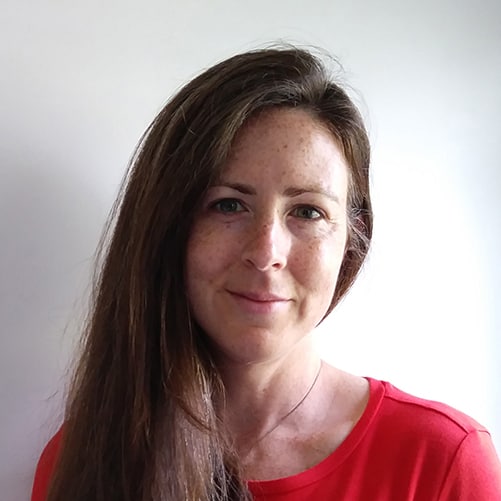
Rachel Parker serves as the Anti-Human Trafficking Services Program Manager at World Relief Triad. She supervises and coordinates outreach and direct services for survivors of both labor and sex trafficking, and collaborative responses across North Carolina’s Piedmont Triad. Rachel supervises the coordination of the Triad Rapid Response Team and the Triad Labor Trafficking Task Force to support victim identification across Guilford, Forsyth, and Davidson Counties and provides training for professionals, communities, and churches across NC.
Rwanda Responds to COVID-19
It’s been a difficult season here in Rwanda. Like many places around the world, Rwanda experienced a total lockdown from mid-March to mid-May as cases of COVID-19 began sprouting up in communities across our country. Today, though some communities have begun to reopen, things have not completely returned to normal.
Most church buildings are still closed. Weddings can only have 30 people in attendance. Everyone must wear facemasks whenever we are out and about, and a country-wide curfew that begins at 7 p.m. and ends at 5 a.m. is still in place.
It’s been a difficult time, indeed, but the hardships and restrictions have caused us to think creatively and find new ways to serve the vulnerable and meet their evolving needs.
At World Relief Rwanda, we currently run programs in six different communities through what we call Church Empowerment Zones (CEZs). CEZs are networks of local churches that have come together to serve the most vulnerable. It is through these CEZs that we are able to offer programs in savings, gender equality and agriculture to name a few.
One such community is Nyamasheke District in Western Province Rwanda. Many of our staff who work in Nyamasheke live in a neighboring district that is currently still on total lockdown because of the high number of COVID-19 cases in that area. As a result, our staff are not able to leave their district to go to work in Nyamasheke.
In addition, many of the men and women in Nyamasheke rely on daily wages to meet their basic needs. But when the markets shut down, they had nowhere to sell their goods and missed out on that vital income. It’s been heartbreaking for myself and the rest of our team to see vulnerable people becoming more vulnerable.
But in the midst of this hardship, our team has been so encouraged to see local pastors from the Nyamasheke CEZ come together to continue serving the vulnerable in their communities. Although these pastors rely on the regular tithes and offerings that aren’t currently coming in due to churches being closed, they’ve banded together, mobilized their members and said, “We are going to do the best we can with the resources God has given us to really care for the vulnerable.”
Pastors like the ones from Nyamasheke have really stepped up by providing food to those who have not been able to make an income. Since March, churches from across the six CEZs served 4,056 families. In addition to these families, World Relief provided support to 1,346 families as well as support for 350 pastors and their families.
As we continue to adapt to this evolving situation in Rwanda, our team has drawn strength from scripture like this one found in 1 Corinthians 15:58 — “Therefore, my beloved brethren, be steadfast, immovable, always abounding in the work of the Lord, knowing that your labor is not in vain in the Lord.”
We’d ask that you continue to pray for us in Rwanda — for the health and safety of our staff as they carry out programs in compliance with social distancing measures; and for the pastors with whom we partner, that they would continue to discern and pursue God’s will in this difficult season.
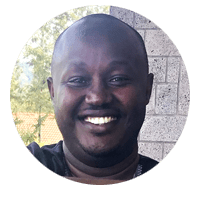
Moses Ndahiro serves as the Country Director for World Relief Rwanda. He is passionate about addressing the roots of human problems and unlocking people’s potential to fulfill their God-given purposes.
WRM Internship Introduced Diverse Experiences, Skills, and Opportunities
Kristen Morris heard about World Relief during her time at Rhodes College. As a member of their City Link program, she volunteered in the Memphis community during three years of her college career. Her first year was spent in an elementary school, but after exploring her international studies major further, she wanted to shift her volunteer focus to connect more closely with her studies. Through her major, she developed an interest in immigration and wanted to get to know immigrants in her new community. This desire made World Relief a great fit for her. The program put her in touch with World Relief Memphis, and she volunteered here for six semesters, until her graduation in May 2020.
One of the things that stood out to her the most about her experience at World Relief was the collaborative nature of the nonprofit sector, both between organizations and with local churches. One of her classes had discussed the large number of nonprofits in Memphis and their collaboration with one another. She was able to see that collaboration first hand with World Relief’s connections to organizations such as Christ Community Health. She also enjoyed seeing the collaboration between churches of different denominations who all agree that they are called to work with immigrants and welcome them to the Memphis community.
Kristen spent her time at World Relief in the Employment and Casework departments. Through this work she interacted with program participants on a daily basis, through home visits and providing support at appointments. By her final semester of the internship, she had become the intern in charge of the Friends of Trezevant English Program. This program connects participants in the Refugee Elders program with residents of a local retirement community. The goal is fostering community and further developing English language abilities among the Elders. She was surprised and impressed by the willingness of the retirement community residents to give of their time and energy to their foreign-born contemporaries. And these relationships were important to her, too. She got to know the Elders participants through driving them to the class, and she even spent time outside of the internship at the retirement home with those she had met through the class.
Kristen credits World Relief for helping her develop professional skills, such as confidence, creative problem solving, and resilience. On her very first day of the internship, she was surprised at how much freedom she was given in accomplishing her assignments. But once she recovered from this initial surprise, she came to appreciate the freedom and the confidence it gave her. And when she made mistakes? They only helped her learn about herself and the graciousness of her refugee neighbors. Both the technical experience with refugees and the confidence she gained during her first two semesters as an intern set her up for successful adaptation of her skills for a program in Morocco in the summer of 2018. She was grateful for already having cross cultural experience, as she lived with a host family and worked in a very different culture from the one she was raised in. Ultimately, Kristen hopes to use all of this experience in her career, either in peace and development or in conflict resolution. We are grateful for her work with us and excited to see how she uses her skills in the future!
By Sarah Barnett, Mobilization Intern
Learn more about becoming an academic or summer intern with World Relief Memphis like Kristen and Sarah! Visit HERE for more information and to submit your application.
Semester Sparked Savannah’s Love for Different Cultures
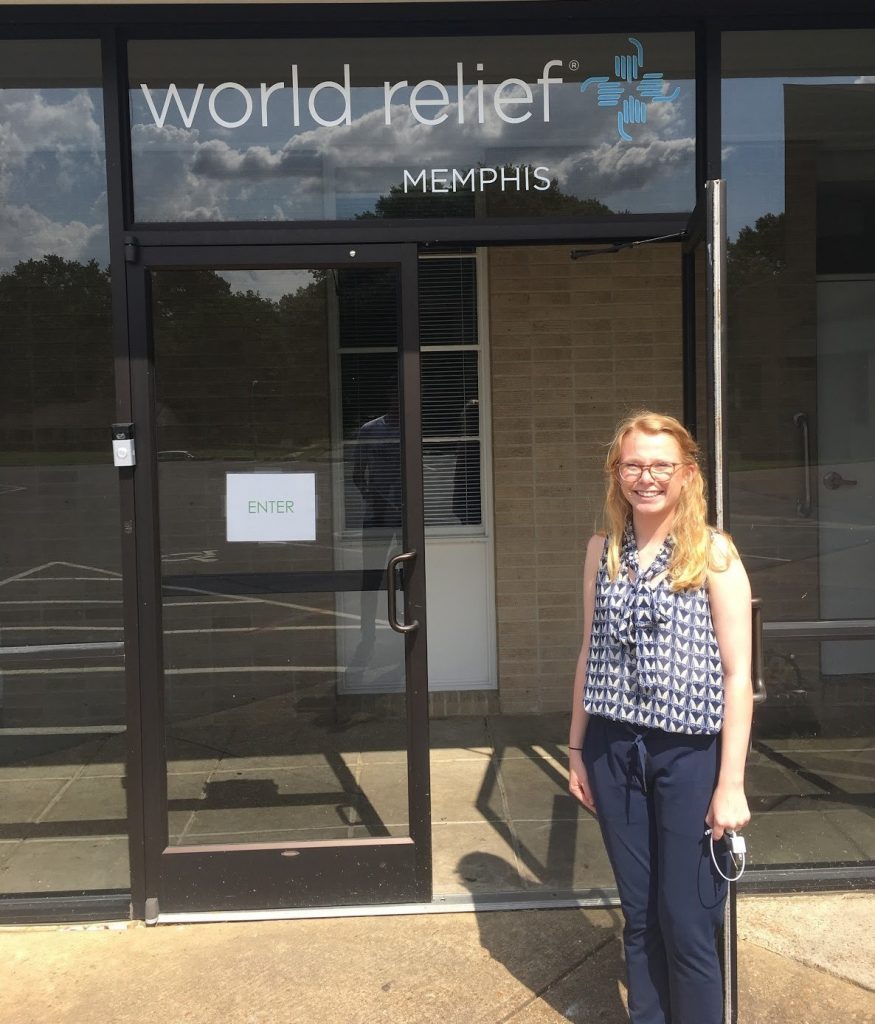
Savannah Day became interested in refugee resettlement through talking to a high school friend who was involved in a refugee resettlement program in Fayetteville, Arkansas. When she looked for a similar organization near the University of Mississippi, where she was a student, she couldn’t find one. After expanding her search to surrounding cities, she found World Relief Memphis. Her goal was to learn more about social service providers and to be exposed to people from different cultural backgrounds. During her time at World Relief, she learned this and so much more through her work in the Direct Services department, as she engaged with both program participants and World Relief staff. Savannah credits the semester internship she spent at World Relief with sparking her love for those who are different from her and their cultures, even driving her to apply for the Peace Corps after her (virtual) graduation from the University of Mississippi in May 2020.
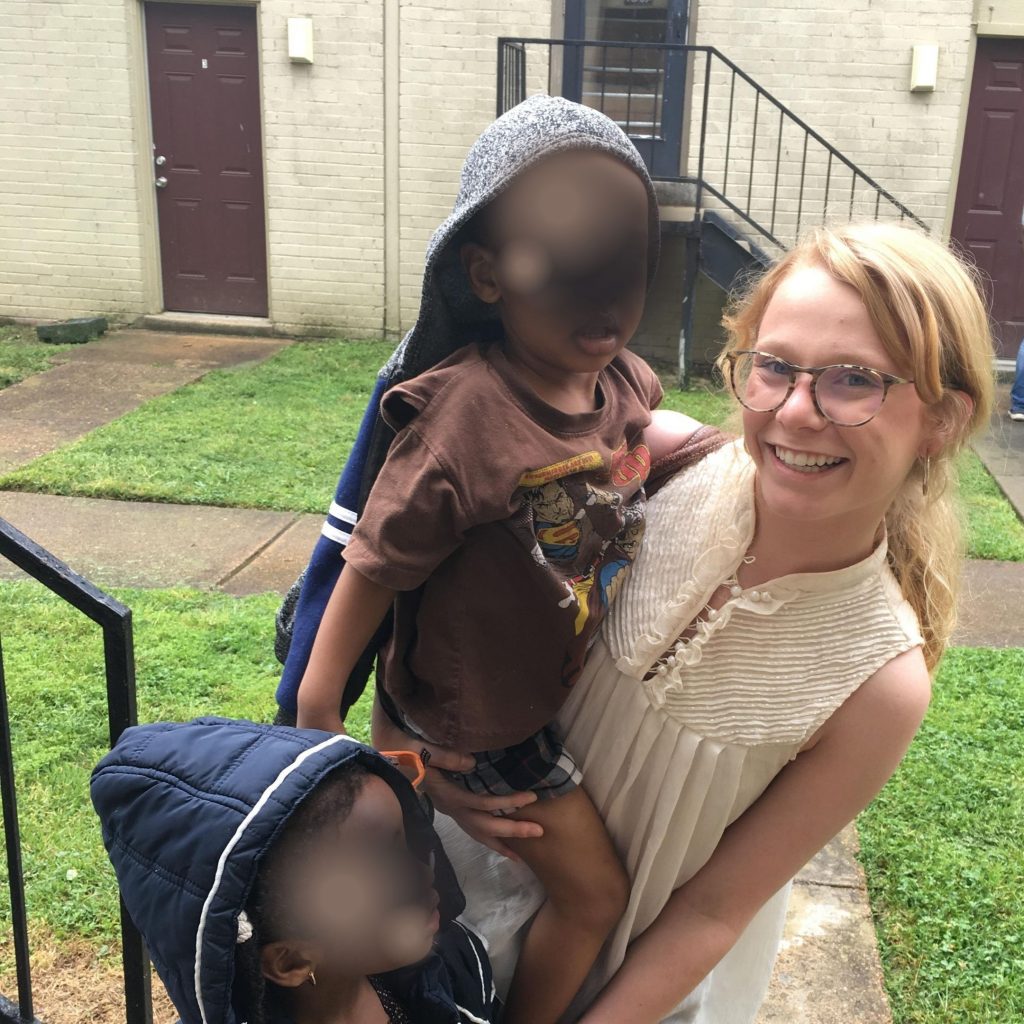
Savannah’s favorite memory from her time at World Relief is the relationships she built, especially with one particular Muslim family from East Africa. Mohamed, Amina, and their two children had lived in a refugee camp for six years before being invited to enter the United States as refugees. When they arrived, Savannah was at the airport to greet them, and walked alongside them as they adjusted to life in Memphis. She provided transportation and support for both Mohamed and Amina, who was pregnant, at their initial medical and social services appointments after arriving. These included Amina’s prenatal care visits, a topic which Savannah didn’t know much about herself. But she was able to learn alongside Amina, including researching related topics on her own to provide better support. Through accompanying the family to their appointments, Savannah built relationships with every family member as she helped them navigate the systems and culture of the United States. During one of these appointments in the springtime, she had an opportunity to share some of the background and celebrations of Easter after Mohamed asked her a question about the upcoming holiday. That same conversation led to him sharing about the Muslim tradition of Ramadan with her, resulting in mutual respect and better understanding for both of them.
Savannah is grateful for the opportunity she had to both contribute toward and learn from the diversity of Memphis. At the end of the semester, she left with a desire to work in a cross cultural environment and to visit a new place, as she had been inspired by the resilience demonstrated by World Relief program participants. This hope led her to a study abroad experience the following summer in Israel, where she worked with refugees displaced from the Israeli-Palestinian conflict. She was also able to explore some of the themes she learned about in her internship in an academic context. Her undergraduate senior thesis was on the topic of resettlement policy and recently changed policies’ impact on the work of World Relief and other similar organizations. Her experience at World Relief instilled an interest in this area and gave her impactful experiences and connections from which she could draw in future endeavors.
Before the pandemic hit, she was on track to leave this coming September for a position with the Peace Corps in Morocco. She still hopes that opportunity develops, but has shifted her plans this year to pursue biblical justice for marginalized populations through a Christian fellowship program in New York City. Her time at World Relief changed the way she viewed the church’s role and responsibility to reach out to their vulnerable neighbors, leading her to highly value this trait in a church body. She points the focus back to Jesus as he routinely uplifted people and populations without power in his society. She has had the opportunity to engage with other believers on this topic, even helping to shift some of her family members’ mindsets toward political questions of immigration by discussing these issues through the lens of shared humanity and generosity.
When asked what her advice is to college students considering this internship, she said, “If you have time you should do it, and if not you should make time for it!” We couldn’t agree more!
By Sarah Barnett, Communications Intern
To learn more about our internship programs, read more HERE. Now’s the time to apply for an internship with us!
Coffee with a Dreamer
Last week, we sat down with Denisse Lopez-Arce, a local CNA, medical interpreter and COVID-19 front-line hero working at Sacred Heart Medical Center. She’s also a Dreamer. Denisse arrived in the U.S. with her parents when she was just a year old. Since then, she has committed to serving her community as a stellar student, college graduate and licensed CNA. Her family is deeply committed to their church community in Arizona where her father serves as a pastor. She has worked hard her whole life to contribute, and with the DACA program under fire, the fruit of her labor is at risk.
“There have been many times in my journey where I felt like everything that I have worked for was slipping away because I don’t have a Social Security number. I was in elementary school when it first became real that I was an immigrant: my parents sat me down and they were like, ‘Okay, Denisse, you need to know that if for whatever reason me and your mom don’t come home, this is what you need to do, these are phone numbers.’ From that moment on, that fear of coming home and not seeing my parents was always there. It didn’t become real for me that I was undocumented until everyone started getting their licenses and I was one of the only ones not driving. My mom would still drive me to school or friends would pick me up just because we didn’t want to risk it. And it was really hard for me to know that because I have a capacity—I can do so much! I’m just not allowed because I don’t have a SSN.
“Later in high school, I did a tech kind of class to become a CNA and went through this entire course in a year. When the time came to get certified, to get my CNA license, I was filling out the application and they asked for a SSN. I remember sitting there and looking at it like I wanted to cry. I was like, ‘is everything that I just did this entire year going to be for nothing because I can’t take the test?’ I’d passed everything in the class. All I needed to do was take the actual certification test. I pretty much had to play it off like it was no big deal. I remember I felt so ashamed although it wasn’t my fault.
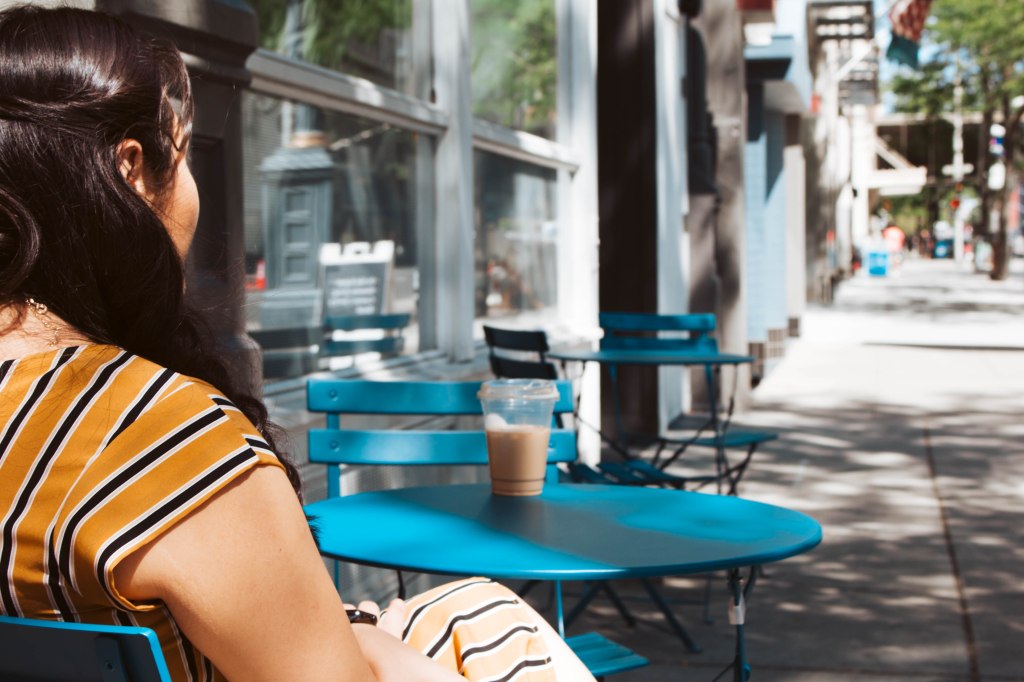
“Junior year I started getting recruitment letters from all the state universities in Arizona because my grades were great. Senior year came along, and I was getting letters like, ‘you’ve been pre-accepted, all you have to do is just finish your application and you can come.’ And I was so hopeful. Throughout my entire educational career, I’ve had outstanding awards. My mom still has awards with signatures from the president, like President Bush, for my ‘presidential academics.’ When I graduated from high school, I didn’t just graduate with a normal diploma: I graduated with what’s called a silver diploma showing the student went above and beyond what was recommended. But then looking into it, I couldn’t really go to a state school or even the community college where I grew up. I’m like, ‘You guys don’t want me all because I don’t have a Social Security number?’ And I gave up, really.
“Then I met this recruiter from Grand Canyon University and she’s like, ‘just apply and see what happens.’ I wanted to study medicine, and I heard that their program was really good—it was one of the top in Arizona. So I just applied. I remember getting an acceptance letter and two scholarships from them because of my grades. At that time, we were going through this legal process. I thought maybe now I could go to school. The lawyers were still working through it, but we had gotten permission to work and be here. I was ecstatic! We had been working through that since I was little. We got ripped off—at one point somebody said they would help, and they took our money and ran. Other lawyers would help us out at first, they’d fill out everything, take our money and then all of a sudden, they’d drop our case. When this lawyer was able to get us social security numbers, we were really hopeful. I applied for FAFSA. Things came through and I ended up getting a grant and another scholarship. All summer went by, I moved into the dorms and school started. I think we were maybe two weeks into the semester when I got an email saying, ‘Hey, this is your financial aid counselor, we need you to come in.’ And I was like, ‘what’s going on?’ I knew I still needed to pay a little bit out of pocket, but we had already set up a payment plan for it. So I go in and I’m like, ‘what’s going on?’ And I remember sitting in front of the financial aid counselor and they’re like ‘your grant from FAFSA couldn’t go through. You’re not really a U.S. Citizen, so these aren’t real scholarships for you.’ They told me I either had to set up a new payment plan or leave. I walked out of that building and bawled my eyes out and I called my parents. I was broken, almost. Everything I’ve been working for, everything that I’ve dreamt about, everything that’s been going on, it was very much like, ‘what am I going to do?’ This was before DACA happened.
I was in college when the news came out. Everyone that I knew was calling each other and we were all like, “Did you hear the news? How soon can we apply? What do we need to do?” I got so many calls that day. At first I was kind of was skeptical. They’ve been talking about things like DACA for a long time and, and it had never gone through. I didn’t want to get my hopes up. But I remember looking at my computer doing homework or something, and the tears just rolling down my face. Like I said, that was the moment I realized that my dreams couldn’t be so easily taken away from me anymore. It was like I could breathe, at least for that one moment in time—I could breathe. Even though it wasn’t and still isn’t a pathway to citizenship, in that moment it felt like I was one step closer, like everything that I’ve done hasn’t been for nothing.

“I don’t think people realize how much people applying to DACA have to go through. The whole process is hectic, really. We found this lady down in Phoenix that really did her research on DACA when it first came out, and she gave us the list of things I needed to apply. Thankfully, my mom is a hoarder when it comes to my awards, so I was able to find all these documents from elementary school and middle school proving that I’d been here long enough and that I’ve been an outstanding citizen. We had to go to the police station and run a background check. We went through all our photos, pinpointing dates of when we were here in the U.S. and we gave her those. Most people are surprised that I have to reapply every two years. Every time I apply it’s like $400, and you have to pay for biometrics too. The whole thing ends up being $600-$800. DACA helped me stay in college and make me feel more at ease. I never had to have that doubt of ‘what if something happens and I have to go back?’ Or, ‘what’s the chance of me maybe getting deported and not being able to finish school?’ And then by the time I knew I had to go do my master’s to work in the medical field.
“Now I work in health care and I’ve seen the gap between the families and the medical team. When you speak English and the doctor speaks to you in English, you’re still sometimes like, “excuse me?” Even when you communicate with the same language you feel lost! I can’t imagine trying to communicate with a different language. I see myself being a bridge for them. We got a family flown here from tri-cities because their kid had a heart condition. All they had was a backpack with their kid’s diaper bag. He was put in a big room in case we needed to do a major procedure on him. The parents are freaking out and they don’t speak any English whatsoever. I’m seeing this from outside, and I said, “hey, can I help you guys? I’m actually a certified medical translator,” and they’re like, “You are? Come here!” And I remember walking into the room and the parents are still freaking out, they’re not really saying much. I started speaking Spanish to them and I was like, “hey, my name’s Denisse, I’m on staff here. I’m also going to be interpreting for you guys. I’m actually certified.” The doctors heard that I’m a certified interpreter. I think that made them feel more calm for me to be interpreting. And I remember the moment I start talking to them was a relief. One of their comments that sticks in my mind was that the parents said, “Did we do anything to hurt our baby? We were following the doctor’s orders and giving him the medicine he needed and everything. Did we do anything to hurt our baby?” They genuinely thought it was their fault. I interpreted that to the doctor and right away the doctor said, “No! If anything, everything you guys have done has kept your baby alive longer.” Then I interpreted that back to the parents. And you could see these parents had kind of a relief because they were feeling so guilty. It was just one of those moments where I was like, ‘being here and being able to help these people is why I’m doing this. That’s why I want to continue to further my career as a medical professional.”
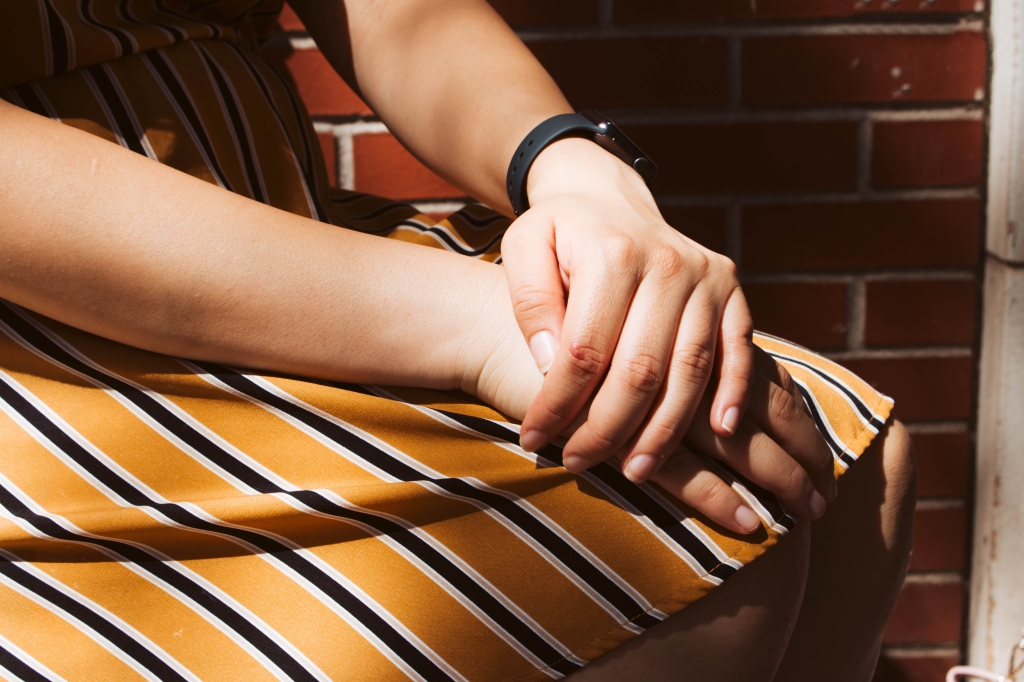
“Both my parents always taught me our purpose is to help others and to serve others in any way that we can, and that God will protect us. It’s not an easy journey. As immigrants, we don’t necessarily want to leave our country, but we know it’s for the best. Even though it’s scary and it’s not easy, it’s still worth it. If we wouldn’t have come over here, my family would’ve been broken. I don’t think I would have had a father; I wouldn’t have a little brother. If we would have stayed in Mexico, I think my family would have been broken completely. Coming to the U.S. saved my family—for us, it was a life changing event. Here is where my parents found Jesus, where they really committed their life to serving him.
I realized God had a greater purpose for me because growing up, I was one of the first Latinas around me to keep pushing. There was this girl, we were kids together, and she was like five years younger than me. She wanted to be in medicine, too, and she was also an immigrant and everything. And growing up, I guess she saw me go through the whole graduating thing and going through the CNA program in high school and going to university. We were getting coffee when I came back from university, and she is like, ‘Denisse, I just want you to know that you were an inspiration to me. I thought that I wasn’t going to be able to continue my education, and you have proven all that wrong.’ I couldn’t believe her telling me this. In that moment, I remember Jesus being like, ‘And this is why. This is why I’ve put you through this journey. Even though it’s hard for you, you keep pushing and you have faith in me that I will pull you through. So you’ve inspired other people.’ I never imagined that my difficulties and my struggle would inspire other people to keep going. I never imagined that even though it might have been difficult for me, my difficulties made it easier for somebody else to not go through the same thing. It makes it worth it for me.
I think it is scary if DACA ends. But also, I think it’s important that we keep talking about it, that we keep fighting for it. Otherwise we’re not going to get anywhere. The more we talk about it, the more we’re going to be able to come to a path for us to be able to become residents and then citizens. If you allow us to become citizens, how much more will we contribute to the community? I’m not just saying the DACA recipients that are in the medical field or lawyers or something like that, but anyone who contributes. This country was founded on “you work hard, you prosper”—the American dream. Are we not part of that as DACA recipients? Aren’t we the core image of the American dream? Coming from somewhere with nothing, look where we are now!”
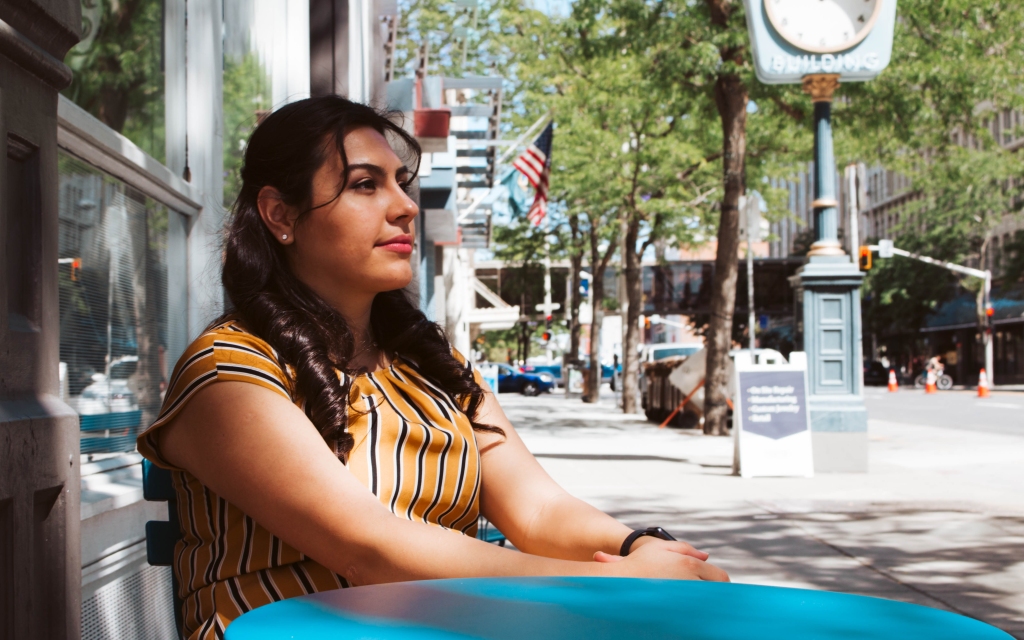
Katherine Bell | 7/20/2020
Dorian: DACA Recipient is Optimistic Despite Immense Odds
Today, June 18, 2020, the Supreme Court made the decision to uphold DACA (Deferred Action for Childhood Arrivals) and protect Dreamers. A permanent decision still needs to be reached in Congress, but today we celebrate with the young men and women across the country who can continue contributing to our communities and long for a path toward citizenship. Dorian is a DACA recipient in Memphis.
In a society that is pushing a message of division daily, it is a blessing to meet someone striving to change the narrative and whose life is an example of the potential for Dreamers in Memphis and beyond. Dorian first arrived in America 16 years ago, when his parents left Honduras for America with the dream of finding stable work to raise their family. Dorian describes his family’s choosing of Memphis as “destiny.” It was a risky decision for his family who arrived undocumented. At the time, Memphis was not a city on the rise, packed with exciting emerging opportunities as it is today. A pivotal event helped change his trajectory moving forward. DACA was passed, giving him a pathway to legally attend schools and pursue his life-long goals.
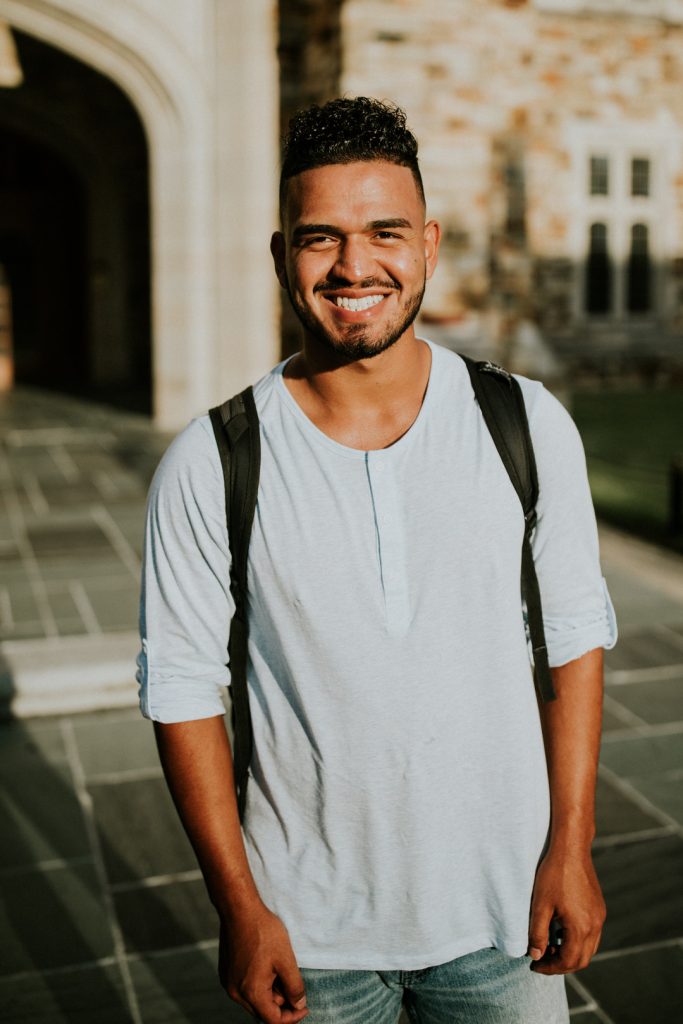
His 8th grade teacher – whom has since become a mentor and like second family – expressed her sense that he had an incredible knack for learning and immense potential. With her and her husband’s support emotionally and financially he was enrolled at Christian Brothers High School. He describes his Freshman year as a culture shock: “There was a huge lack in minority students. The quality of education was very good. But, I did deal with stereotypes and microaggressions because I was different.” Undeterred, Dorian used the negative energy as fuel to keep him motivated and considered himself to be his biggest enemy. “At the end of the day, if I fail, it’s because of myself. I can’t let societal obstacles stop me.” He finished his Freshman year with the highest GPA in his class. Continuing to build on his success, he excelled in honors classes and just graduated from Rhodes College where he studied Economics.
Currently, Dorian is striving to enter into the corporate field and better the country that he has called home for many years. However, in these past few years, the opportunities for DACA Dreamers have been called into question. “When the removal of DACA was first threatened, I felt my dreams crashing in. I gave everything I have to make America great yet they suddenly don’t want me here?” His fear is far from the only one, as thousands DACA recipients are living with the knowledge of policy change looming overhead. As we talked, our photographer and fellow advocate for refugees and immigrants made an excellent point: “We all came to America at different points in history with dreams and goals unachievable in our homelands. If now certain people are not allowed here, by extension of the same logic, we all should not be here.” Despite this, Dorian is choosing a life of joy. He has returned the compassion and guidance he received from his mentors while a young student and has become a mentor for a 3rd grader and 6th grader while also remaining active in the DACA community at Rhodes. “My main goal every day is this: How can I translate my love of all people into actions? Your experiences define what you believe and that’s how I’ve developed my faith.”
As we look to the future of DACA Dreamers and Latinx immigrants in this country, there is still much work to be done for us to fully embody Christ’s command to love and accept the sojourners. Dorian’s goal is to change common misconception and spread love. “We didn’t come here to be criminals and rapists. I want my story to show that despite immense odds that you can still be successful. I want to widen the doors for the future of world changers. I always see hope and want to change the narrative about immigrants, refugees, and illegal aliens. I’m optimistic that this will happen.”
In light of the Supreme Court decision, Dorian shared these thoughts:
SCOTUS’s recent ruling on DACA elicited a wave of emotions–gratitude and hope are the two most prominent. The uncertainty of my legal status has been a burden that is mentally draining. As I looked forward to starting my full-time job, my concern grew, as the termination of my legal status would crush my hopes of entering the corporate world. However, today’s news brought temporary relief. I have not seen my extended family in over 15 years, so the possibility of using advance parole to see them and travel for work is exhilarating. Unfortunately, Dreamers do not have the privilege to vote, but I hope people that can vote to do so. The 5-4 ruling in favor of DACA highlights how one vote can make a difference. This is a victory, but we still have a war ahead. I am hopeful for an equitable and just world, not just for DACA recipients.
By Nathan Spencer
Photos by Emily Frazier
==================
June is #immigrantheritagemonth and #refugeeawareness month and we have been featuring stories of Memphis students who are thriving as part of our community. With your support, World Relief offices across the US have helped file approximately 4,300 applications for protections under the DACA program over the last eight years. Together, we’ve provided thousands of young immigrants with access to education, jobs and a promising future. When you give today, you ensure our vital work together continues. If you would like to sign the Dreamers letter to Congress with the Evangelical Immigration Table, click here.











